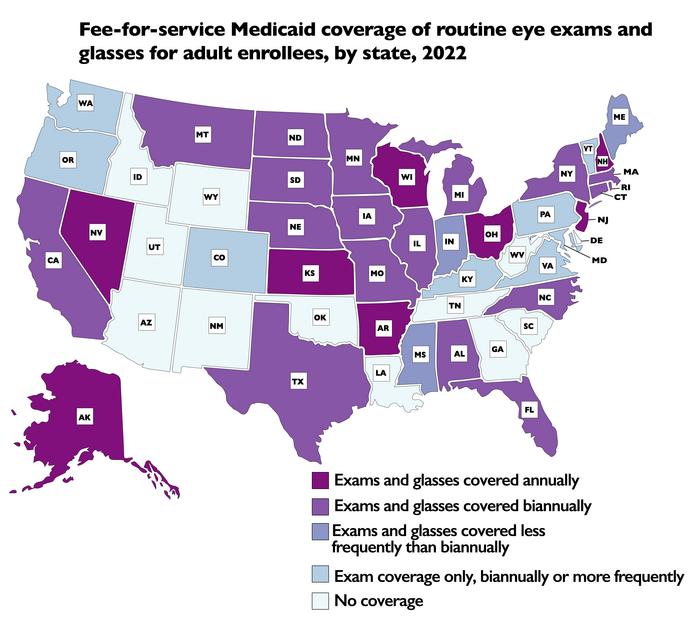A study supported by the National Institutes of Health (NIH) shows that 6.5 million Medicaid enrollees (12%) lived in states without coverage for routine adult eye exams; and 14.6 million (27%) resided in states without coverage for eyeglasses. The study based on 2022-23 coverage policies, published in Health Affairs, is among the first to provide a comprehensive, state-by-state analysis of adult Medicaid benefits for basic vision services in both fee-for-service and managed care.

Credit: Health Affairs
A study supported by the National Institutes of Health (NIH) shows that 6.5 million Medicaid enrollees (12%) lived in states without coverage for routine adult eye exams; and 14.6 million (27%) resided in states without coverage for eyeglasses. The study based on 2022-23 coverage policies, published in Health Affairs, is among the first to provide a comprehensive, state-by-state analysis of adult Medicaid benefits for basic vision services in both fee-for-service and managed care.
Medicaid provides health coverage to millions of Americans, including eligible low-income adults, children, pregnant women, elderly adults and people with disabilities. While the federal government establishes overarching rules for Medicaid, each state runs its own program, including determining eligibility and coverage policies. The law allows states to determine coverage of eye exams and eyeglasses for adults. It is important to note that for children, federal law entitles Medicaid-enrolled infants, children, and adolescents to Medicaid coverable, appropriate, and medically necessary services needed to correct and ameliorate health conditions, including vision services.
“Our study clearly shows that there are opportunities to expand coverage of routine vision services at the state level, and based on previous research, we expect more generous coverage would reduce rates of vision impairment, improve quality of life, and promote health equity,” said Brandy Lipton, Ph.D., study author and associate professor of health, society and behavior at the University of California, Irvine.
Exams conducted by an eye care provider are the only way to detect eye diseases early, when treatment has the best chance to prevent vision loss. Exams are also essential to obtain a prescription for glasses to correct refractive error, the leading cause of vision impairment that affects more than 12 million people in the U.S.
The analysis of 2020 Medicaid enrollee data, and 2022-23 coverage policies, shows that state-level coverage for adults varied widely; gaps in coverage included:
- In 20 states, fee-for-service Medicaid policies did not cover glasses at all; and in 12 of those states, eye exams were also not covered.
- Seven states had no coverage for exams or glasses under both fee-for-service and managed care policies (Arizona, Idaho, New Mexico, Oklahoma, Tennessee, West Virginia, and Wyoming).
- Thirty-five states did not cover low vision aids such as magnifiers and loupes.
“Visual impairment can be corrected with glasses in most instances, but not all. Particularly among older adults, lack of coverage for low vision aids may be an important gap,” said Lipton.
Moreover, even in states that had coverage for vision care services, copays and restrictive policies could still be a barrier for enrollees following through on an exam or glasses. Fully two-thirds of states required enrollees to cost share.
Medical Expenditure Panel Survey data show that out-of-pocket expenses for an uninsured adult for an eye exam and glasses can cost around $485, which is more than a third of the monthly income for a single adult living at or below the federal poverty level.
Maine had the most restrictive glasses coverage policy, where glasses were covered only once per lifetime, and only for people who required an unusually strong prescription to correct their vision.
Previous research shows that vision impairment can increase the risk of falls and hip fractures, difficulties performing activities of daily living, social isolation, depression, cognitive impairment and mortality.
“Reducing disparities in vision care is a powerful way to improve quality of life for everyone. This study points to opportunities for expanding coverage to reduce inequities in basic vision care for people with lower incomes,” said Michael F. Chiang, M.D., NEI director.
With the aging of the U.S. population, the number of people with vision impairment from all causes is expected to double by 2050.
The study was funded by NEI grant R01EY033746.
Reference:
Lipton, BJ; Garcia, J; Boudreaux, MH; Axatyan, P; and McInerney, P. “Most state Medicaid programs cover routine eye exams for adults, but coverage of other routine vision services varies.” Published August 5, 2024, Health Affairs. DOI:10.1377/hlthaff.2023.00873
Journal
Health Affairs
DOI
10.1377/hlthaff.2023.00873
Method of Research
Data/statistical analysis
Subject of Research
People
Article Title
Most State Medicaid Programs Cover Routine Eye Exams for Adults, But Coverage of Other Routine Vision Services Varies
Article Publication Date
5-Aug-2024
COI Statement
NA




